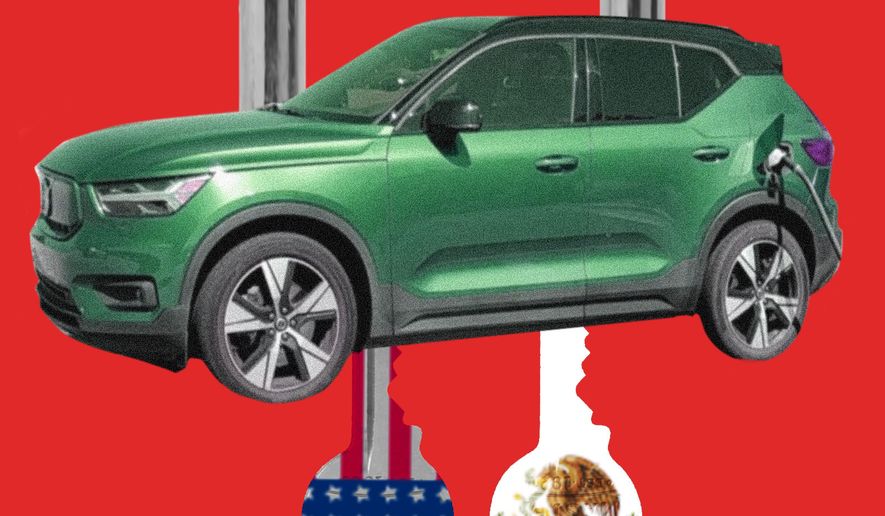A version of this story appeared in the daily Threat Status newsletter from The Washington Times. Click here to receive Threat Status delivered directly to your inbox each weekday.
OPINION:
As negotiators prepare to revisit the United States-Mexico-Canada Agreement, much of the debate frames the talks as a tug-of-war: Mexico fighting to keep jobs versus the United States pushing for tougher rules.
That is the wrong lens.
If done right, this negotiation will lead to a decisive win for both nations, securing our shared automotive supply chain, protecting jobs and ensuring that North America can compete and beat China and Europe in the decades ahead.
It was President Trump who first had the courage to scrap the outdated North American Free Trade Agreement deal and replace it with the U.S.-Mexico-Canada Agreement. For decades, Washington establishment insiders told Americans that NAFTA was untouchable, even as it hollowed out factories and shipped jobs overseas.
Mr. Trump proved them wrong. He delivered a modern trade deal that put American workers first, enforced higher labor standards and reined in unfair practices that had undermined our competitiveness.
Now, USMCA 2.0 provides another chance to build on Mr. Trump’s success.
Mexico’s auto parts industry is one of the largest in the world. In 2023 alone, it exported more than $80 billion worth of auto parts, nearly 80% of which went directly to the United States. That trade supports more than 870,000 American auto parts jobs and millions more in assembly, dealerships and related industries.
Here’s the overlooked fact: More than 40% of the value in those Mexican exports is American content. Put simply, Mexico’s success is America’s success. The two economies are deeply intertwined, and no one benefits more from Mexico’s competitiveness than U.S. workers and automakers.
For the United States, a strengthened USMCA means more of the auto value chain anchored in North America. Stronger rules of origin, enforceable labor standards and limits on third-country inputs mean secure supply lines and less dependence on China.
For American workers, it translates into job stability in parts and assembly plants. For consumers, it means reliable access to vehicles without the price shocks that occur when supply chains stretch across oceans.
For Mexico, the stakes are just as high.
A retooled USMCA would lock in foreign investment, accelerate the shift toward higher-value production of goods such as electric vehicle batteries, software and advanced electronics, and create opportunities to raise wages and improve working standards without losing competitiveness.
In other words, Mexico would move from being seen merely as a low-cost base to a global hub for innovation and high-value manufacturing. This is how Mexico secures its place at the center of the global automotive economy.
The risks are real. If talks stall or if rules choke competitiveness, both countries lose. Investments will dry up, factories will slow and the winners won’t be in North America; they will be in Shanghai and Berlin.
That’s why leadership is critical. Mr. Trump understood that trade is not paperwork; it’s about economic strength, national security and the dignity of work. His “America First” vision also proved to be a win for Mexico because when the U.S. secures supply chains, Mexico benefits as a key partner.
The opportunity is greater than the risks. By treating these talks as a joint investment in the future, the U.S. and Mexico can build the most competitive automotive supply chain in the world.
Mexico brings talent, scale and proximity. The United States brings innovation, capital and unmatched market power. Together, we can reanchor the global auto industry in North America.
This is not Mexico versus the United States. It is Mexico and the United States versus the rest of the world. If negotiators seize this moment, guided by Mr. Trump’s bold vision, USMCA 2.0 will prove that cooperation is the best path to shared prosperity.
• Mark Vargas served as a civilian in the Office of the U.S. Secretary of Defense from 2007 to 2010, completing 14 missions to Baghdad. Follow him on X: @MarkAVargas.




Please read our comment policy before commenting.